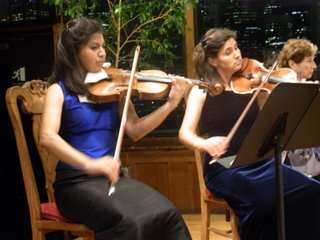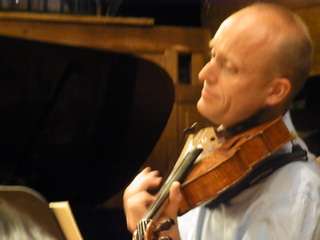|
Back
Czechs and balances New York
BargeMusic, Fulton Ferry Landing, Brooklyn
09/10/2010 - & September 12, 2010
Bohuslav Martinù:Madrigals for Violin and Viola, H.313
Antonin Dvorák: Terzetto in C major, Opus 74 – Piano Quintet in A major, Opus 81
Gideon Klein: Sonata for Piano
Adele Anthony, Renata Arado (Violins) Espen Lilleslatten (Viola), Darrett Adkins (Cello), Rita Sloan (Piano)

R. Arado, A. Anthony, R. Sloan (© Herring Rollmop)
”Aaaaaaagh!!”, I mumbled to myself. A week which began with a Labor Day’s homage to the workers of America, should have ended with a day of solemnity and thought for the Ninth Anniversary of the destruction of the World Trade Centre by a dozen-odd fanatics.
Instead of this, we in America were poisoned with a noxious salmagundi of crazy preachers, vicious demagogues, religious hatreds, shouting poster-swingers, radio-talkers pulling out one lie after another, and a supposedly civilized country turning into a vocally incendiary Tartarus.
Fortunately, we few cultivated citizens had a choice. We could either say, “Aaaaaaagh!”, we could hit the nearest lamppost, or we could assuage our momentary Apocalypse by listening to the right music in the right place.
Right place being the moolit river, with Walt Whitman’s bridge above us, and the right music being Antonin Dvorák, as well as other krajané (Czech compatriots), performed by some highly accomplished musicians.
The single work from the last half, in fact, could be the antidote to any psychological venoms. Dvorák’s Piano Quintet in A, like his Cello Concerto, is a document of such human character–play, wistfulness, nostalgia, harmonic concordance–that it should only heard by live humans, no recording machines.
This was true with the five musicians here. The first few bars were a bit laggard, but once into it, the quintet, many of whom are members of Scandinavian orchestras, played with a lilt and sometimes unalloyed joy. Nothing was hard-edged on these strings, not even in the Scherzo. Rather, they played lightly, the transparency exhibiting just how accomplished Dvorák was in chamber music.

E. Lilleslatten (© Herring Rollmop)
An entirely different Dvorák emerged in the rarely played Terzetto, for two violins and viola. That viola part, played by Espen Lilleslatten, was the strongest of the three, perhaps because Dvorák probably wanted his beloved cello, but was writing it for two friends. It is hardly an easy work, and the end achieves remarkable invention.
Martinù, one of the most prolific composers of any century, was typical Czech in writing music supposedly jovial, yet masking something pensive in the beautifully original second movement. Ms. Anthony and Mr. Lilleslatten were the two able soloists.
I save the best–and saddest–for last. A Sonata for Piano by Gideon Klein, played with feeling and lapidary loveliness by Rita Sloan.
Mr. Klein was a Czech piano, conducting and compositional prodigy, whose early pieces breathed by 20th Century techniques and the semi-melodic repetitive Janácek-like melodies. I use the word “early” because the Jewish artist was sent to a concentration camp at the age of 21 (where he was permitted to form musical groups). He died, in mysterious circumstances in a camp just before the end of the war at the age of 25.
This Sonata was the first time I had heard his music, and its merit was in both the derivation and the originality. At first it sounded like a 12-tone piece by Alban Berg, but the repetitions of a triple-motif in the first movement, and the almost childish play of the final Allegro vivace still haunts me.
Mr. Klein would have obviously been a major composer. With his sensitivity and inspiration, he would have donned the magical crowns of both Dvorák and Martinù. But war–like the supposed perpetual war which has sprung out of our “Nine-Eleven”– destroys the values on both sides.
Fortunately, a concert like this at BargeMusic (to be repeated Sunday), while never assuaging the horror of our times, gives us at least the illusion of serenity.
Harry Rolnick
|